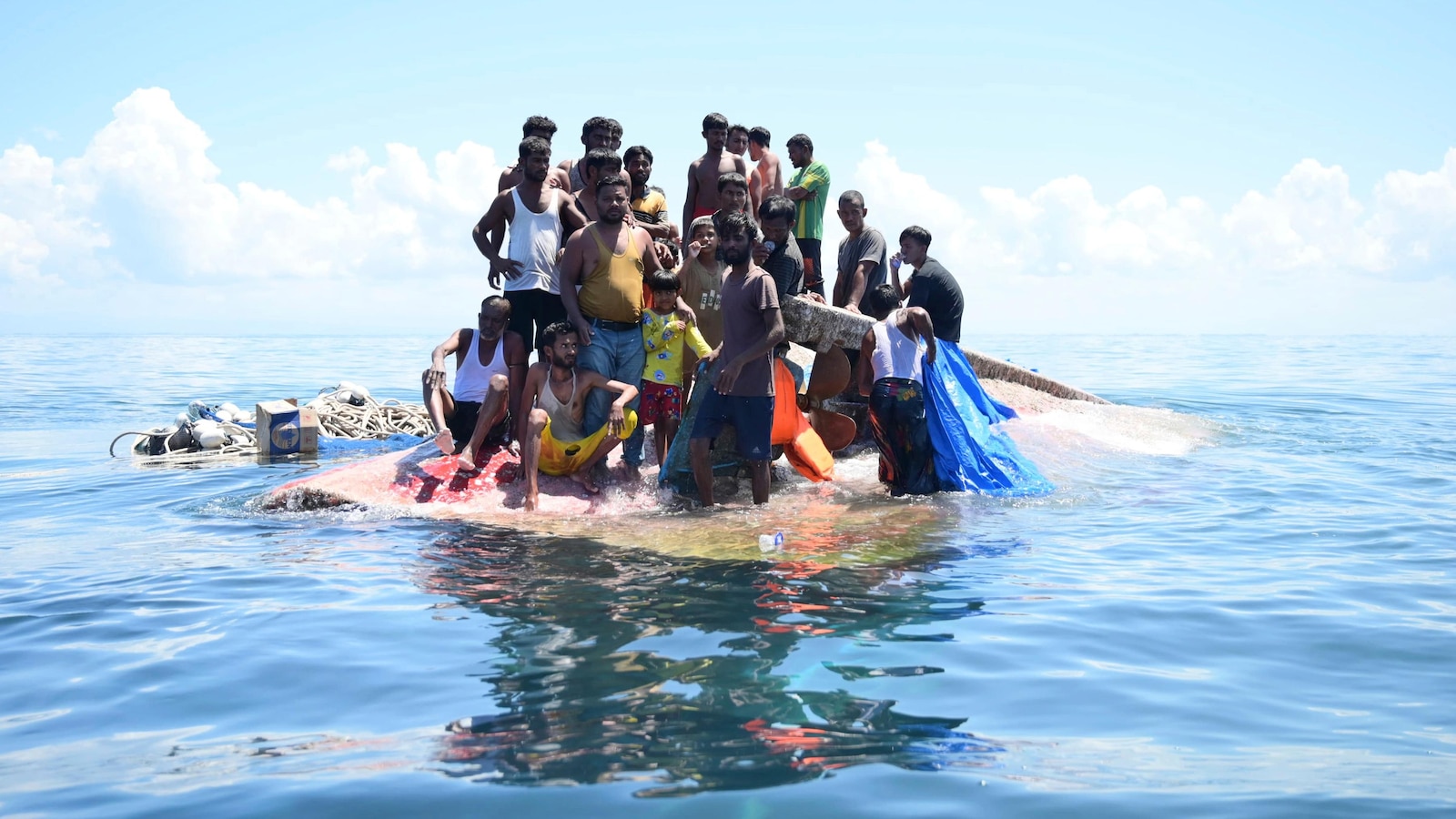
MEULABOH, Indonesia — An Indonesian search and rescue ship on Thursday located a capsized wooden boat that had been carrying dozens of Rohingya Muslim refugees, and began pulling survivors who had been standing on its hull to safety.
An AP photographer aboard the rescue ship said 10 people had been taken aboard local fishing boats and another 59 were being saved by the Indonesian craft.
Men, women and children, weak and soaked from the night’s rain, wept as the rescue operation got underway and people were taken aboard a rubber dinghy to the rescue boat.
It was unclear how many refugees were aboard the small craft when it capsized off of Indonesia’s northernmost coast on Wednesday, with six survivors initially rescued by local fishermen estimating between 60 and 100 people.
It was unclear whether all managed to cling to the capsized craft overnight or whether some had drowned.
Indonesia’s search and rescue team only left Banda Aceh city in the evening Wednesday, many hours after the capsizing, and initially had difficulty locating the boat in the choppy waters off the coast.
It finally found the boat and the survivors about midday on Thursday.
Amiruddin, a tribal fishing community leader in Aceh Barat district, said those rescued indicated that the boat was sailing east when it started leaking and then strong currents pushed it toward the west of Aceh. The six said others were still trying to survive on the capsized craft.
About 740,000 Rohingya were resettled in Bangladesh to escape the brutal counterinsurgency campaign by security forces in their homeland of Myanmar.
Thousands have been trying to flee overcrowded camps in Bangladesh to neighboring countries with Indonesia seeing a spike in refugee numbers since November which prompted it to call on the international community for help. Rohingya arriving in Aceh face some hostility from some fellow Muslims.
Indonesia, like Thailand and Malaysia, is not a signatory to the United Nations’ 1951 Refugee Convention outlining their legal protections, and so is not obligated to accept them. However, they have so far provided temporary shelter to refugees in distress.
Last year, nearly 4,500 Rohingya — two-thirds of them women and children — fled their homeland of Myanmar and the refugee camps in neighboring Bangladesh by boat, the United Nations refugee agency reported. Of those, 569 died or went missing while crossing the Bay of Bengal and Andaman Sea, the highest death toll since 2014.
Returning safely to Myanmar is virtually impossible because the military that attacked them overthrew Myanmar’s democratically elected government in 2021. No country has offered them any large-scale resettlement opportunities.
___
Tarigan reported from Jakarta. AP journalist David Rising contributed to this story from Bangkok.
In a harrowing incident that highlights the ongoing plight of Rohingya refugees, a group of individuals were rescued from a capsized boat off the coast of Bangladesh. The refugees, who were found weeping, weak, and soaked to the bone, were in desperate need of assistance after their vessel encountered trouble at sea.
The Rohingya people, a Muslim minority group from Myanmar, have faced persecution and violence in their home country for years. Many have been forced to flee their homes in search of safety and refuge in neighboring countries, often risking their lives on dangerous journeys by sea.
The recent incident serves as a stark reminder of the dangers faced by Rohingya refugees as they attempt to escape the violence and persecution in Myanmar. The individuals rescued from the capsized boat were in a state of distress, with many suffering from dehydration, exhaustion, and hypothermia.
Local authorities and humanitarian organizations sprang into action to provide medical assistance, food, and shelter to the rescued refugees. The individuals were taken to a nearby hospital for treatment and were later transferred to a refugee camp where they could receive further support and care.
The rescue operation underscores the urgent need for increased international support and attention to the plight of Rohingya refugees. The ongoing crisis in Myanmar has forced hundreds of thousands of individuals to flee their homes and seek safety in other countries, often facing perilous journeys and harsh conditions along the way.
As the world continues to grapple with the refugee crisis, it is crucial that governments, organizations, and individuals come together to provide assistance and support to those in need. The recent rescue of Rohingya refugees from a capsized boat serves as a stark reminder of the human cost of conflict and persecution, and the importance of standing in solidarity with those who are most vulnerable.


